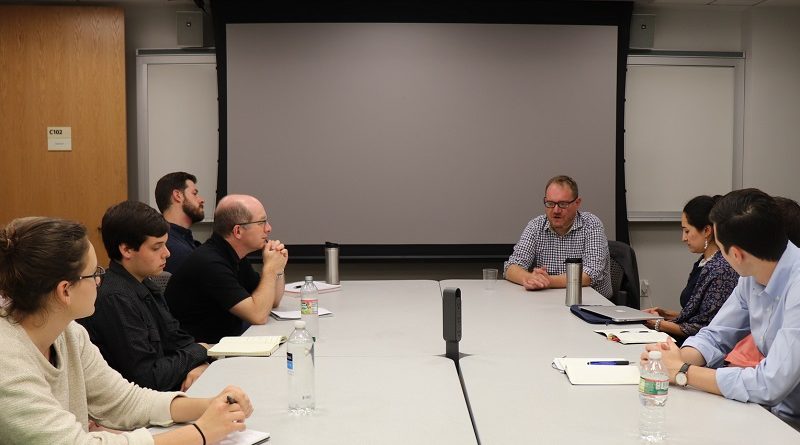Researcher Noah Tucker on Uzbekistan Reforms
By Michael Mandelkorn, M.A. 2020 Candidate, Tufts University
Nearly any discussion of Central Asia today is framed by the specter of the collapse of the Soviet Union. But while the concept of collapse is often acknowledged, it is seldom fully appreciated. Most discussions might use it as a framework to analyze Central Asian economies or political structures. But the impact it had on the day-to-day lives of citizens cannot be overstated and is too often ignored. It is this matter that Noah Tucker, senior editor at Radio Ozodlik, RFE/RL’s Uzbek service, referred to when he spoke about the ‘collapse of the lived experience’ of everyday people in Tashkent, during Thursday evening’s talk at The Fletcher School, entitled “Uzbekistan after Karimov: Reform or Redecoration.”
[fshow username=FletcherRussia photosetid=72157704212513914 width=”800″ height=”534″]
According to Tucker, this juncture saw the collapse of a system that was bad but predictable. People knew which rules needed to be followed. While laws were opaque, and leaders were corrupt, an unwritten set of rules and procedures governed people’s daily lives and kept them fed, working, and out of trouble. Then everything changed, and out of the ashes was built a new system — one with a shiny, eloquent democratic constitution, one that touted social rules based on clear-cut laws. But there was a problem with this new society, as neither these new rules nor the old ones seemed to apply to real life. For citizens of Uzbekistan, the post-Soviet era had brought new difficulties and dangers in navigating daily life, as Uzbek politics were being quickly reshaped.
This new, puzzling world was built under the gaze of Islam Karimov, who commanded the country through transition and beyond, serving first as the President of the Uzbek Soviet Socialist Republic until he declared independence from the USSR, becoming the first President of the Republic of Uzbekistan in 1991. By the end of his career, Karimov had come to be known for his brutality and paranoia. Hence, upon Karimov’s death, when then-Prime Minister Shavkat Mirziyoyev, selected to serve as interim president, began hinting at reforms, he quickly found a cult following of eager supporters.
Within a few short months, Mirziyoyev was officially elected to the presidency by an overwhelming majority, and began to preside over a number of noticeable changes. But the new president had a new problem on his hands. Despite having already teased some reforms, he had no intention of breaking completely with Karimov’s legacy. He was caught in the same duality of rules trap as so many other Uzbeks — he had inherited a government that did not follow its own rules. But outright admitting that was tantamount to sabotaging the Karimov legacy. Without admitting to widespread corruption, what could he do to crack down on corruption when corruption was already illegal? This was not a question of lawmaking. Anticorruption laws were already on the books. What was needed was a cultural sea change; a push to get the state to observe and honor its own laws.
Mirziyoyev instituted a program of virtual office hours (qabulxonasi) through which citizens could lodge comments and questions and forced a huge swath of government departments to do the same. He promoted a program (muloqot xalq bilan) to cut down on graft and petty corruption and devised a way (muloqot xalq bilan) for small businesses to ensure they are not unfairly targeted by corrupt police. Mirzoyoyev even saw several top government officials prosecuted for corruption — here, Tucker urges us, we must start to look more critically.
For Mirzoyoyev has replaced a number of government department heads with his allies. While he abolished a Karimov-era requirement for all mosques to use a single, government-sanctioned sermon, allowing for religious freedom across the country, that single-sermon policy has recently returned. According to Tucker, Mirziyoyev’s supporters and many members of the public at large believe this tightening-down of policies to be the work of anti-reformer elements. They believe that Mirzioyev is there to protect them, but many Central Asia experts remain skeptical.
In Tucker’s view, there are only two ways to interpret Mirziyoyev’s time in office. The first, most charitable interpretation is that he truly is battling reactionary elements and bringing about reform as best he can while toeing the old Karimov line. It is difficult to change the system when it can throw obstacles back. The second, most likely possibility is that Mirziyoyev’s liberalizing policies were simply a way to purge the system of the old guard and replace them with his friends. Once there are no more challenges to his authority, the system will snap back to its Karimov-era repression. That being said, there is only one way to tell which interpretation is correct — wait and see what happens when a political outsider comes to challenge Mirziyoyev.

